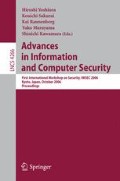Abstract
We propose a short traceable signature scheme based on bilinear pairings. Traceable signatures, introduced by Kiayias, Tsiounis and Yung (KTY), support an extended set of fairness mechanisms (mechanisms for anonymity management and revocation) when compared with the traditional group signatures. Designing short signatures based on the power of pairing has been a current activity of cryptographic research, and is especially needed for long constructions like that of traceable signatures. The size of a signature in our scheme is less than one third of the size in the KTY scheme and about 40% of the size of the pairing based traceable signature (which has been the shortest till today). The security of our scheme is based on the Strong Diffie-Hellman assumption and the Decision Linear Diffie-Hellman assumption. We prove the security of our system in random oracle model using the security model given by KTY.
Access this chapter
Tax calculation will be finalised at checkout
Purchases are for personal use only
Preview
Unable to display preview. Download preview PDF.
References
Abdalla, M., An, J., Bellare, M., Namprepre, C.: From identification to signatures via the Fiat-Shamir transform: Minimizing assumptions for security and forward-security. In: Knudsen, L.R. (ed.) EUROCRYPT 2002. LNCS, vol. 2332, p. 418. Springer, Heidelberg (2002)
Ateniese, G., Camenisch, J., Hohenberger, S., Medeiros, B.: Practical Group Signatures without Random Oracles. Cryptology ePrint Archive, Report 2005/385, http://eprint.iacr.org/
Ateniese, G., Camenisch, J., Joye, M., Tsudik, G.: A practical and provably secure coalition-resistant group signature scheme. In: Bellare, M. (ed.) CRYPTO 2000. LNCS, vol. 1880, p. 255. Springer, Heidelberg (2000)
Boneh, D., Boyen, X.: Short Signatures Without Random Oracles. In: Cachin, C., Camenisch, J.L. (eds.) EUROCRYPT 2004. LNCS, vol. 3027, pp. 56–73. Springer, Heidelberg (2004)
Boneh, D., Boyen, X., Shacham, H.: Short Group Signatures. In: Franklin, M. (ed.) CRYPTO 2004. LNCS, vol. 3152, pp. 41–55. Springer, Heidelberg (2004)
Boneh, D., Lynn, B., Shacham, H.: Short signatures from Weil pairing. In: Boyd, C. (ed.) ASIACRYPT 2001. LNCS, vol. 2248, p. 514. Springer, Heidelberg (2001)
Bellare, M., Micciancio, D., Warinshci, B.: Foundations of group signatures: Formal definitions, siimplified requirements, and a construction based on general assumptions. In: Biham, E. (ed.) EUROCRYPT 2003. LNCS, vol. 2656. Springer, Heidelberg (2003)
Bellare, M., Shi, H., Zhang, C.: Foundations of group signatures: The case of dynamic groups. Cryptology ePrint Archive, Report 2004/077, http://eprint.iacr.org/
Boyen, X., Waters, B.: Compact Group Signatures Without Random Oracles. Cryptology ePrint Archive, Report 2005/381, http://eprint.iacr.org/
Camenisch, J.: Efficient and generalized group signatures. In: Fumy, W. (ed.) EUROCRYPT 1997. LNCS, vol. 1233, pp. 465–479. Springer, Heidelberg (1997)
Chaum, D., van Heyst, E.: Group signatures. In: Davies, D.W. (ed.) EUROCRYPT 1991. LNCS, vol. 547, pp. 257–265. Springer, Heidelberg (1991)
Fiat, A., Shamir, A.: How to prove yourself: Practical solutions to identification and signature problems. In: McCurley, K.S., Ziegler, C.D. (eds.) Advances in Cryptology 1981 - 1997. LNCS, vol. 1440. Springer, Heidelberg (1999)
Kiayias, A., Tsiounis, Y., Yung, M.: Traceable Signatures. In: Cachin, C., Camenisch, J.L. (eds.) EUROCRYPT 2004. LNCS, vol. 3027, pp. 571–589. Springer, Heidelberg (2004)
Kiayias, A., Yung, M.: Group signatures: Efficient constructions and annymity from trapdoor-holders. Cryptology ePrint Archive, Report 2004/076, http://eprint.iacr.org/
Miyaji, A., Nakabayashi, M., Takano, S.: New explicit conditions of elliptic curve traces for FR-reduction. IEICE Trans. Fundamentals E84-A(5), 1234–1243 (2001)
Nguyen, L., Safavi-Naini, R.: Efficient and Provably Secure Trapdoor-free Group Signature Schemes from Bilinear Pairings. In: Lee, P.J. (ed.) ASIACRYPT 2004. LNCS, vol. 3329, pp. 372–386. Springer, Heidelberg (2004)
Pointcheval, D., Stern, J.: Security arguments for digital signatures and blind signatures. Journal of Cryptology 13(3), 361–396 (2000)
Rubin, K., Silverberg, A.: Supersingular Abelian varieties in cryptology. In: Yung, M. (ed.) CRYPTO 2002. LNCS, vol. 2442, p. 336. Springer, Heidelberg (2002)
Schnorr, C.: Efficient signature generation by smart cards. Journal of Cryptology 4(3), 161–174 (1991)
Author information
Authors and Affiliations
Editor information
Editors and Affiliations
Rights and permissions
Copyright information
© 2006 Springer-Verlag Berlin Heidelberg
About this paper
Cite this paper
Choi, S.G., Park, K., Yung, M. (2006). Short Traceable Signatures Based on Bilinear Pairings. In: Yoshiura, H., Sakurai, K., Rannenberg, K., Murayama, Y., Kawamura, S. (eds) Advances in Information and Computer Security. IWSEC 2006. Lecture Notes in Computer Science, vol 4266. Springer, Berlin, Heidelberg. https://doi.org/10.1007/11908739_7
Download citation
DOI: https://doi.org/10.1007/11908739_7
Publisher Name: Springer, Berlin, Heidelberg
Print ISBN: 978-3-540-47699-3
Online ISBN: 978-3-540-47700-6
eBook Packages: Computer ScienceComputer Science (R0)

